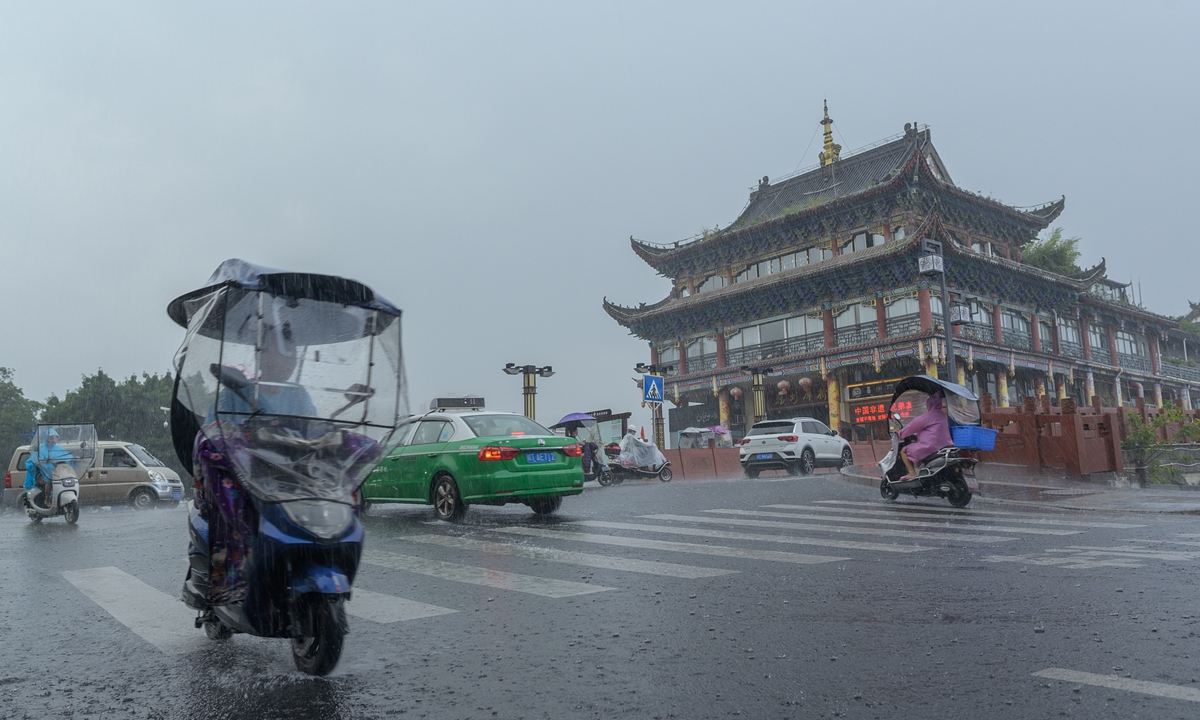46,400 people evacuated overnight as heavy rainfall hits SW China’s Sichuan after prolonged extreme heat

Heavy rain washed Ya'an, SW China's Sichuan Province on August 25, 2022 after days of drought. Photo: CFP
Heavy rain has hit seven cities and prefectures in Southwest China's Sichuan Province since Saturday, including Chengdu, Guangyuan and Garze Tibetan Autonomous prefecture, forcing 46,400 people to evacuate overnight. No geological disasters have been reported in these places so far.
Among these cities and prefectures in Sichuan, the north and northwest of Chengdu will see heavy rainfall this weekend while cities of Mianyang, Ya'an, Guangyuan, Deyang, Aba and Garze prefectures will also see moderate to heavy rain. The highest rainfall occurred in Xiling snow mountain ski resort in Chengdu from 5 pm Saturday to 7:30 am Sunday, reaching 165.1 millimeters.
The Central Meteorological Observatory continued to issue a blue alert for rainstorms on Sunday morning, among which the heavy rain in the northern and western Sichuan Basin may even exceed 100-200 millimeters. These areas will also experience strong convective weather such as short-term heavy precipitation, thunderstorms and strong winds.
Besides, continued high temperatures have increased the risk of natural disasters in parts of Sichuan, where drought in the province has made the soil loose or caused it to harden, and short-term heavy rainfall could potentially cause mudslides and other extreme natural disasters, local authorities warned.
The National Meteorological Center (NMC) continued to issue a yellow alert for high temperatures for some parts of the country on Sunday morning, including eastern Sichuan, with the highest temperature even exceeding 40 C.
The persistent high temperatures since June this year have been the most severe since 1961, when complete meteorological observation records started, China's National Climate Center (NCC) announced on August 17.
The NMC said continued rainfall will help ease the heat and drought in Sichuan and reduce the risk of fire in the forest and grassland, but it will also increase the risk of landslides, mudslides and floods.
The National Defense Headquarters issued an emergency notice on Sunday, urging several provinces, including Sichuan, to prepare for short-term heavy rainfall and possible changes in river hydrological conditions, as well as ensure that local officials convey emergency and warning information to local residents who are at risk from natural disasters.
Public evacuation and disaster prevention and control measures should be implemented in strict accordance with the disaster warning information, with priority on vulnerable groups such as the elderly who are living alone and the disabled.
The notice issued by the Sichuan provincial government also required local authorities across the province to urgently inspect key areas including scenic spots, reservoirs, embankments, and construction sites, which are prone to natural disasters, and to arrange for administrators to keep an eye on key places and dissuade tourists from unsafe behavior.
Moreover, authorities in Chengdu, capital of Sichuan Province, has also issued three-level warning of geological disasters late on Sunday, reminding local authorities and residents to strengthen natural disaster prevention.
The evacuation of residents in many parts of the province is a preventive measure against natural disasters including floods and mudslides, although no major natural disasters have occurred so far, with the previous prolonged drought gradually easing, a staff member from the Sichuan provincial emergency management department told the Global Times on Sunday.
The measures taken by the government to monitor the hydrological and geological conditions in real time and evacuate local residents in advance are aimed at ensuring the safety of local people's lives and property.
The evacuees, some of whom are living in temporary shelters built by the government, and others who have taken refuge with relatives and friends, are now able to go about their daily lives and return home once local authorities assess that the risks are cleared, the staff member noted.
According to the staff member, the impact of the previous long period of unprecedented high temperatures on local electricity and residents' daily lives has gradually eased with the drop in temperature and rainfall in some parts of the province.
Electricity for general and commercial use in Sichuan was restored on Sunday, CCTV quoted the State Grid Corporation of China as saying, noting that Sichuan's daily generating capacity of hydropower was 460 million kilowatt-hours on Sunday, a rise of 9.5 percent from the lowest value in the previous period. Electricity for large industries is also recovering.
A resident surnamed Hu living in Neijiang, a city in the eastern part of Sichuan, told the Global Times on Sunday that although there was no precipitation at the time in the city, the temperature had dropped compared with previous days. She added that many local residents had been worried about power outages some time ago, but were relieved by the news that the power crunch had eased.

